Does The Fine Print Really Prevent You from Seeking Damages?
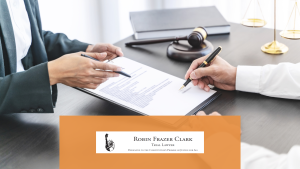 When you think of Disney, images of magical experiences and joyful family moments likely come to mind. What you probably don’t associate with Disney is a legal battle over whether signing up for a streaming service could waive your right to sue them in court. But that’s exactly the issue at the center of a recent wrongful death lawsuit involving the entertainment giant. The case raises eyebrows and has serious implications for personal injury law and the enforceability of arbitration agreements.
When you think of Disney, images of magical experiences and joyful family moments likely come to mind. What you probably don’t associate with Disney is a legal battle over whether signing up for a streaming service could waive your right to sue them in court. But that’s exactly the issue at the center of a recent wrongful death lawsuit involving the entertainment giant. The case raises eyebrows and has serious implications for personal injury law and the enforceability of arbitration agreements.
Linking a Streaming Service to a Wrongful Death Lawsuit
The lawsuit in question involves Jeffrey Piccolo, who tragically lost his wife, Kanokporn Tangsuan, after she suffered a fatal allergic reaction while dining at a Disney-affiliated restaurant. Piccolo decided to take legal action against Disney, only to be met with an argument that left many scratching their heads. Disney claimed that because Piccolo had signed up for a Disney+ account, he had agreed to resolve all disputes—including those entirely unrelated to streaming—through arbitration. In simpler terms, Disney argued that by clicking “I agree” on their streaming service’s terms and conditions, Piccolo had forfeited his right to take them to court over his wife’s death.
Social Media is the Digital Double-Edged Sword for Personal Injury Claims
 Everyone on social media knows that a picture of their lunch can go viral if captioned cleverly enough. However, think twice about what you post if you’re in the middle of a personal injury lawsuit. Sure, your followers might love to see you smiling at a party or hitting the trails on a sunny afternoon, but those innocent posts could be exhibit A in court, undermining your claims of injury. Here’s the scoop on how your social media habits could turn your case upside down and what you can do to keep your digital footprint from tripping you up.
Everyone on social media knows that a picture of their lunch can go viral if captioned cleverly enough. However, think twice about what you post if you’re in the middle of a personal injury lawsuit. Sure, your followers might love to see you smiling at a party or hitting the trails on a sunny afternoon, but those innocent posts could be exhibit A in court, undermining your claims of injury. Here’s the scoop on how your social media habits could turn your case upside down and what you can do to keep your digital footprint from tripping you up.
The Evidence You Didn’t Mean to Provide
Let’s cut to the chase: your social media posts can end up front and center in a courtroom. Imagine claiming severe injuries in court while your recent Facebook album says “Weekend Warrior” filled with photos of you mountain biking. Not a great look, right? Insurance companies and defense lawyers love digging through social media to find just such contradictions. That video of you at a dance party could quite literally dance away with your credibility and your compensation.
The Number One Rule in Personal Injury Law: Document Everything
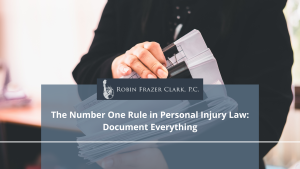 Accidents can turn your life upside down in an instant. The pain, the disruption, and the uncertainty that follows are hard enough to handle without having to worry about legal battles. However, ensuring you get the justice and compensation you deserve starts with documenting your injuries properly. It’s not just about the money–more often than not, most survivors wish the ordeal never happened—it’s about holding those responsible accountable and making sure you get the support you need.
Accidents can turn your life upside down in an instant. The pain, the disruption, and the uncertainty that follows are hard enough to handle without having to worry about legal battles. However, ensuring you get the justice and compensation you deserve starts with documenting your injuries properly. It’s not just about the money–more often than not, most survivors wish the ordeal never happened—it’s about holding those responsible accountable and making sure you get the support you need.
Seek Immediate Medical Attention
First things first, see a doctor immediately after the accident. This is not just for your health; it’s for your legal protection. Even if you think your injuries are minor, medical professionals can identify issues that might not be immediately obvious. And every visit creates an official record of your injuries. Do not skip follow-up appointments. Each visit builds a continuous care history, critical for proving the extent and progression of your injuries.
My Client’s Presidential Pardon Achieved Seven Years Before President Biden’s Sweeping Pardons

I was very happy to hear that President Biden has decided to right historical wrongs by pardoning any U.S. veterans who were convicted for being gay while serving in our U.S. Armed Forces. It is well past time for our country to acknowledge this wrong and the damage it did to so many gay veterans. As President Biden stated: “Today, I am righting an historic wrong by using my clemency authority to pardon many former service members who were convicted simply for being themselves,” Biden said in a statement. “We have a sacred obligation to all of our service members –- including our brave LGBTQI+ service members: to properly prepare and equip them when they are sent into harm’s way, and to care for them and their families when they return home. Today we are making progress in that pursuit.” About time, is all I can say.
I find this very interesting given my experience in securing a Presidential Pardon for a client who had been convicted of having a homosexual relationship while he was serving as an Officer in the U.S. Army. He served a year and a half in Ft. Leavenworth Prison for being gay. I worked for this client for 6 years pro bono, partly because my innate sense of Justice drove me to do so, partly because I have been fighting for equality for gay people for the last 40 years or so, and partly because I could not let this injustice to this client go on and be able to look my two children in the eyes. Both of my kids, who were in college at the time, could not believe that our Government, with its vasts resources, would use those resources to prosecute and convict a U.S. Veteran of simply being who he was. It was simply unfathomable to them and to me. But it really happened. So I set out on a 6 year journey and struggle to obtain a Presidential Pardon for him. Since being gay in the U.S. Army was a Federal offense, only a Presidential Pardon would do. He had been convicted on July 17, 1989, which means he endured 28 years of having the conviction and a dishonorable discharge on his record. This resulted in his being unable to obtain a home mortgage, being limited in potential jobs he would be hired for, being unable to vote, just as some examples of the impact on his life this had.
I will never forget that telephone call on January 17, 2017 from the Department of Justice Pardon Attorney, informing me that President Obama would be granting my client a pardon. What an unbelievable moment! Probably my greatest achievement as a lawyer. And then to call my client and hear his elation on the phone was an incredible moment.
Treading Carefully While Staying at VRBO or AirBnB Rentals

Vacation rentals through platforms like Airbnb and VRBO promise memorable experiences, but what happens when an injury disrupts your stay? Most people probably aren’t considering the possibility of seeking compensation for an injury while vacation planning, but accidents (and negligence) can happen any time. Both property owners and the platforms have legal protections that could impact your ability to receive compensation.
Property Owner Liability and Insurance Issues
Property owners who use platforms like Airbnb and VRBO to list rentals are required to maintain their properties in safe conditions. This includes conducting necessary repairs and warning guests about any potential dangers. If a property owner fails to perform appropriate duty of care, and a guest is injured, the owner may be held liable for those injuries.
Key Reasons You Need a Litigator
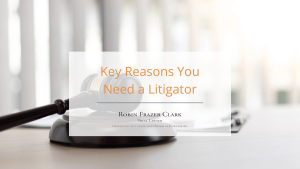 When you need legal help, knowing who to turn to can make a big difference. Many people use the terms “attorney” and “litigator” interchangeably, but they refer to different roles in the legal field. After a serious injury, you might get embroiled in a legal battle that could take a significant amount of time. But let’s be honest: time is of the essence, and getting your life back on track as soon as possible is just as important as your right to seek justice. It’s time to clear up the confusion and explain the key differences between an attorney and a litigator.
When you need legal help, knowing who to turn to can make a big difference. Many people use the terms “attorney” and “litigator” interchangeably, but they refer to different roles in the legal field. After a serious injury, you might get embroiled in a legal battle that could take a significant amount of time. But let’s be honest: time is of the essence, and getting your life back on track as soon as possible is just as important as your right to seek justice. It’s time to clear up the confusion and explain the key differences between an attorney and a litigator.
Attorneys Go to Court, Right?
Most people wish that simply graduating from law school was enough to cover all types of cases, but unfortunately, that’s just not the case. An attorney, or lawyer, is a professional qualified to give legal advice, represent clients in legal matters, and conduct lawsuits. Attorneys can work in many legal areas, from drafting wills and handling estate matters to advising companies on legal transactions. They may negotiate contracts, help with property purchases, counsel businesses, or work in family law, assisting with divorce and custody arrangements.
Solitary Confinement in Georgia Prisons is “Draconian”: Confinement in a Prison Shower is Immoral and Unconscionable

Last week, Judge Marc Treadwell, United States District Court Judge for the Middle District of Georgia, held several officers of the Georgia Department of Corrections in contempt of court for failing to correct numerous violations of the Federal and Constitutional rights of Georgia inmates who are housed in solitary confinement in Georgia Prisons. In his 100 page Order, Judge Treadwell threatened them with fines and ordered an independent monitor to ensure compliance with a settlement agreement for the Special Management Unit of the Georgia Diagnostic and Classification Prison in Jackson, about 50 miles south of Atlanta. In its Order, the Court found that prison officials falsified documents and said they routinely placed new arrivals at the facility in “strip cells,” where one inmate said he was not given clothes or a mattress and could not use the toilet because it was broken and filled with human waste.
A psychology professor and prison expert, Craig Haney, Ph.D., J.D., told the court back in 2018 he had toured maximum security prisons in roughly two dozen states, and Georgia’s SMU unit was “one of the harshest and most draconian” he had seen. His report, submitted to the court in 2018 by lawyers for prisoners — included images of prisoners with self-inflicted cuts, blood on the floor of one cell and the window of another, and descriptions of “extraordinarily harsh” living conditions. His conclusion: “The prisoners at this facility face a substantial risk of serious harm, harm that may be long-lasting and even fatal.” Southern Center for Human Rights attorney Sarah Geraghty, who represented the prisoners, said in a news release back in 2018 when the initial agreement was reached“A civilized society doesn’t lock people in isolation cells for years on end,” she said. “It was past time to move out of the dark ages.”
These solitary confinement cells at the heart of this Contempt Order measure 7 feet X 13.5 feet, and contain a toilet and mattress. Inmates housed in these solitary confinement cells receive their meals through a slit in a solid door that has a small window at the top. You may think the photograph at the top of this blog post is of one of these solitary confinement cells that have been ruled to be inhumane. But you would be wrong. That’s because this photograph is of a shower stall in Smith State Prison in Glennville, Georgia, where my client was held for nearly three days and where, ultimately he hanged himself, resulting in his death. The shower stall measures only 3.75 feet X 6.75 feet, which makes the Georgia solitary confinement cells practically Ritz Carlton luxury in comparison. Also, as you can see, there was certainly no mattress in the shower stall, nor toilet where my client could relieve himself for three days. No ventilation, no heat, no cup of water. Just imagine. Housing an inmate in a shower violates Georgia Department of Corrections’ Standard Operating Procedures. So does falsifying cell counts so it looks as if an inmate is in his cell when he is actually physically being illegally detained in a shower stall. 
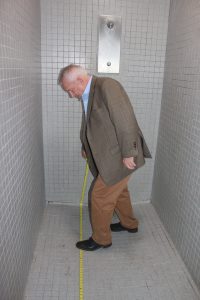

Avenues of Compensation After an Accident
 When someone suffers an injury due to another’s actions, it’s not just the physical pain that affects them. The ripple effects can touch every aspect of their life, from financial stability to emotional well-being. In such challenging times, understanding how the law works to compensate for these losses can offer a glimmer of hope. The legal system recognizes two main types of damages in personal injury cases: compensatory and punitive damages. These legal mechanisms aim to restore balance, offer relief, and ensure justice for those wronged.
When someone suffers an injury due to another’s actions, it’s not just the physical pain that affects them. The ripple effects can touch every aspect of their life, from financial stability to emotional well-being. In such challenging times, understanding how the law works to compensate for these losses can offer a glimmer of hope. The legal system recognizes two main types of damages in personal injury cases: compensatory and punitive damages. These legal mechanisms aim to restore balance, offer relief, and ensure justice for those wronged.
Compensatory Damages: Restoring What Was Lost
At the heart of most personal injury claims in Georgia is the concept of compensatory damages. These are the funds awarded to the injured party to cover both the tangible and intangible losses they’ve endured. Economic losses are straightforward and include costs like medical bills, rehabilitation expenses, lost wages, and any property damage that may have occurred. These are measurable and aim to reimburse for out-of-pocket expenses directly linked to the injury.
Georgia’s Attorney General Would Certainly Ban Abortion Medication Mifepristone
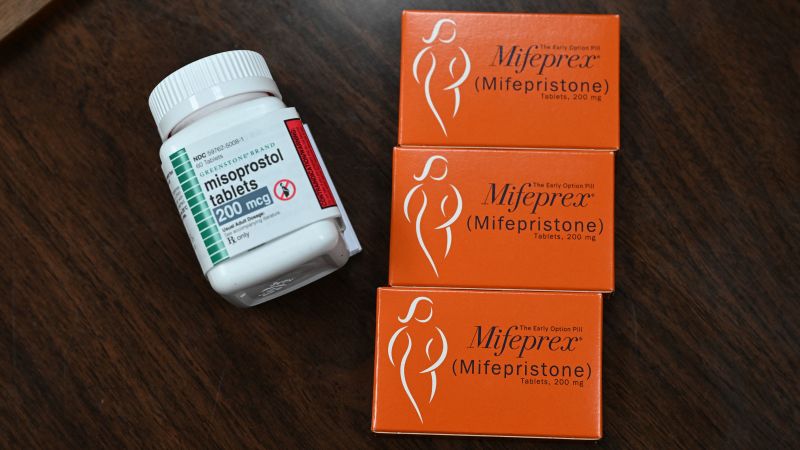
Today the United States Supreme Court is hearing oral arguments in Case No. 23-235 FOOD AND DRUG ADMINISTRATION V. ALLIANCE FOR HIPPOCRATIC MEDICINE, a case in which certain physicians have sued the FDA alleging permitting the use of Mifepristone violates their rights. Much of the oral argument focuses on “standing,” i.e., whether these physicians even have the right to bring such a case against the FDA. I am listening right now live to the the SCOTUS oral arguments and even the super Conservative Justices seem extremely skeptical about standing. Here are the questions presented before the Supreme Court today:
QUESTION PRESENTED:
This case concerns mifepristone, a drug that the U.S. Food and Drug Administration
 Atlanta Injury Lawyer Blog
Atlanta Injury Lawyer Blog















